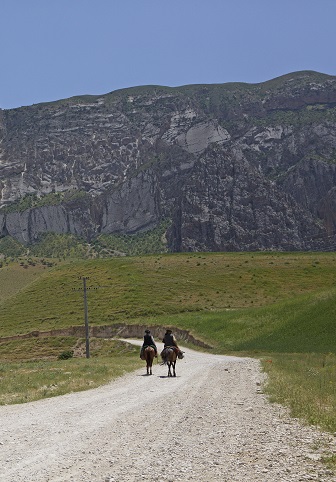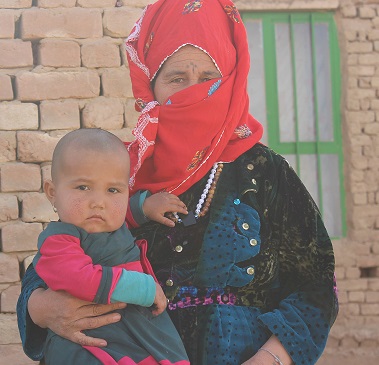
‘Life was getting worse by the day’: Rozi Khal
Rozi Khal was 13 years old when her first-born son, almost a newborn, was injured in the Soviet-Afghan War. The incident sent her packing for Pakistan, and the heaving refugee camp her family would call home for the next 27 years.
“We didn’t have anything. My husband worked as labourer in Queta city doing very tough work which made him sick. Now he can hardly move,” says Rozi Khal, now 45. “We returned to Afghanistan five years ago. Life was getting worse by the day. until Hand in Hand Afghanistan arrived in our village.”
Qaleen Bafan, Afghanistan
Afghanistan’s displacement crisis
 Rozi Khal’s cicumstance is far from unique. Between returning refugees like her and the multitudes of people displaced within Afghanistan by drought and conflict, some 3.5 million Afghans have forced to relocate in recent years – the equivalent, in sheer scale, of the entire population of California being displaced within the US. This in a country with none of the wealth or infrastructure that other countries take for granted.
Rozi Khal’s cicumstance is far from unique. Between returning refugees like her and the multitudes of people displaced within Afghanistan by drought and conflict, some 3.5 million Afghans have forced to relocate in recent years – the equivalent, in sheer scale, of the entire population of California being displaced within the US. This in a country with none of the wealth or infrastructure that other countries take for granted.
In September 2017, Hand in Hand partnered with Deutsche Gesellschaft für Internationale Zusammenarbeit (GIZ), the German government’s development agency, to help displaced Afghans work their way towards a prosperous future in the country’s growing poultry value chain. By summer 2020, we’ll have helped 4,250 of them launch their own sustainable poultry farms.
Afghanistan’s poultry value chain is ideal for returnees and internally displaced people. Skills are easily learned. Incomes, compared to other rural sectors, are high. And for people like Rozi Khal, the benefits don’t end there. Poultry farms can be run from entrepreneurs’ own households – crucial for members with restricted mobility. At the same time, nutrition and food security improve – a matter of particular interest to those responsible for childcare.
A bright future

Rozi Khal holds her daughter.
One day, Rozi Khal received a knock at her door. It was a Hand in Hand trainer: would she like to become a member? Rozi Khal joined a Self-Help Group in Qaleen Bafan village, Balkh Province, and received poultry vocational skills training. Next, she built a backyard poultry farm with the support and guidance of her Hand in Hand trainer. “I never had a business idea until I learnt in training that I can have a business in my home,” says the mother of seven. “The poultry enterprise enables me to earn a decent income and help my family.”
With her training complete and chicken coop built, Rozi Khal received 25 chickens, two bags of feed and some other materials she would need to launch her business. Today, she produces 20 eggs a day, earning approximately AFN 2,400 (US $32) a month.
“Now I’m earning more than I used to working in a brickmaking factory, which was very difficult work,” she says. “The training and support I received from Hand in Hand has encouraged me to start the enterprise and now I am confident I will generate a good income.”
As for the future? “I am planning to expand my enterprise within the coming months to increase my brood because there is a good market for eggs,” she says.
By the numbers
Producing 140 eggs a week
Earning AFN 2,400 (US $32) a month
Caring for family of 9
Next case study: Meet Gloria, the former refugee growing crops – and profits
